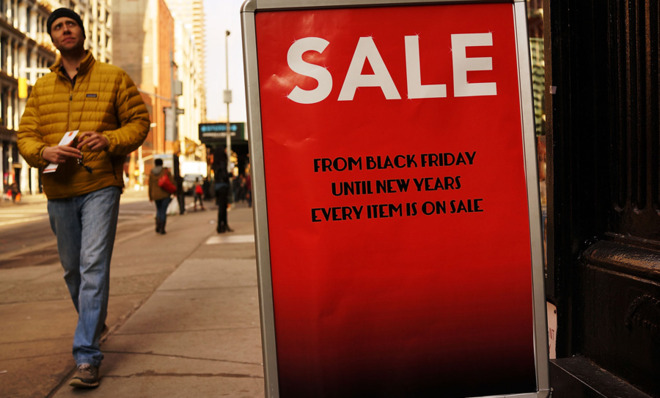How the Great Recession has changed the way we shop — even during the holidays
There has been a profound and fundamental shift among U.S. consumers since 2008

A free daily email with the biggest news stories of the day – and the best features from TheWeek.com
You are now subscribed
Your newsletter sign-up was successful
In the run-up thus far to the 2013 holiday season, the lasting effects of the Great Recession are on full display. From the early start and staggered promotional schedule to a focus on discounts and layaway, there has been a profound and fundamental shift among U.S. consumers since 2008.
The Great Depression of the 1930s effected a generation of Americans in many lasting ways. Extreme frugality, even hoarding of mundane items, was exhibited well after the Depression lifted and economic expansion began again. The fear, stress, and real-world experience of going without took its toll on millions — a shift in consciousness that is all too familiar for a generation of consumers today burdened by the Great Recession.
"It has changed the way we purchase and consume. It has changed our perception of what we deserve as shoppers, from retailers and brands," said Sharon Love, CEO of TPN, a retail consulting company. "There is never going to be a shift back; there is new level setting every year."
The Week
Escape your echo chamber. Get the facts behind the news, plus analysis from multiple perspectives.

Sign up for The Week's Free Newsletters
From our morning news briefing to a weekly Good News Newsletter, get the best of The Week delivered directly to your inbox.
From our morning news briefing to a weekly Good News Newsletter, get the best of The Week delivered directly to your inbox.
The recession has made its own mark and anyone gathering evidence need look no further than the trends emerging during this holiday season.
Moderate growth is good. Retail sales are expected to be modest, but steady this season. The National Retail Federation projects an increase of 3.9 percent over 2012's 3.5 percent holiday season sales growth. "Our forecast is a realistic look at where we are right now in this economy — balancing continued uncertainty in Washington and an economy that has been teetering on incremental growth for years," said NRF President and CEO Matthew Shay.
But it isn't total sales that tell our story, but the way in which shopping has evolved. The intentions and behavior of U.S. shoppers is dramatically different than it was six years ago.
Discounts are the norm. Paying full price is nearly inconceivable. Shoppers know that retailers will ultimately comply, marking things down or offering some extra value. We have the patience to wait things out, but most retailers aren't letting it get to that point. Holiday promotions and sales are planned up to 10 months in advance. The holiday season began in late August, before back-to-school sales had even wound down. Retailers aren't panicked, they have simply adjusted to now well-entrenched behavior, and are giving shoppers what they want, without sacrificing much margin and messing with sales projections in December.
A free daily email with the biggest news stories of the day – and the best features from TheWeek.com
Early shopping is here to stay, spurred in part by shoppers' more prudent and patient behavior. Stores are opening on Thanksgiving Day because there is a demand for it and now an established sales history to prove it. No amount of backlash will change that now.
Budgets cannot be ignored. Shoppers now understand what a budget really is, something that sets limits and informs purchasing. Budget busting is no longer an option, nor is it fashionable. The excess of decades past — the over-the-top 1980s, go-go 1990s, and bubble-laden 2000s — are all mere memories. And not of the good sort.
Forget splurging. The old "one for him, one for me," pattern of gift giving is out, according to NRF. This season, shoppers are expected to cut back on "self-gifting," even when the deals seem too good to pass up. When asked if they plan to take advantage of sales or price discounts during the holiday season to make additional non-gift purchases, only 57 percent said yes, down from 59 percent last year.
We have learned to do without, to buy what we need and not much else. Conspicuous consumption is once again vulgar, across all income levels. Fiscal discipline is now in vogue, a value that matches the reality of today's consumers.
The recession officially ended nearly four years ago, but its effects are long reaching. Prior economic dips were followed by surges in spending, holiday or otherwise. Not this time. The retail industry has even stopped mentioning such a prospect.
There is no return to normal, just this new one.
-
 Political cartoons for February 16
Political cartoons for February 16Cartoons Monday’s political cartoons include President's Day, a valentine from the Epstein files, and more
-
 Regent Hong Kong: a tranquil haven with a prime waterfront spot
Regent Hong Kong: a tranquil haven with a prime waterfront spotThe Week Recommends The trendy hotel recently underwent an extensive two-year revamp
-
 The problem with diagnosing profound autism
The problem with diagnosing profound autismThe Explainer Experts are reconsidering the idea of autism as a spectrum, which could impact diagnoses and policy making for the condition